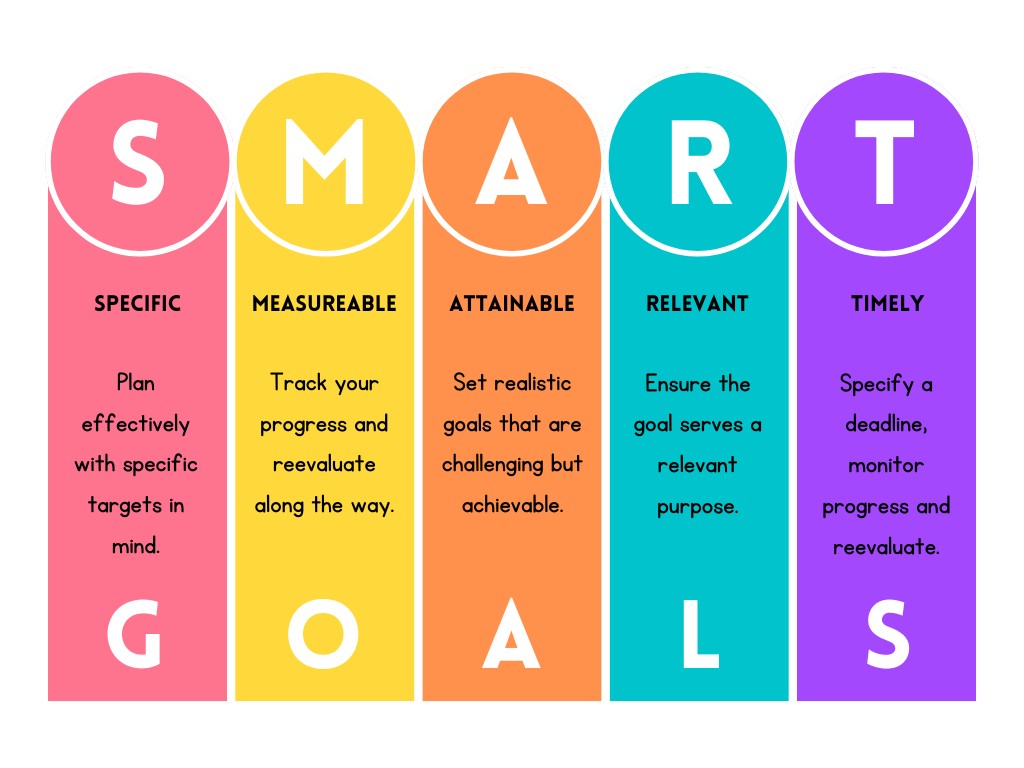Goal setting is a very crucial aspect of personal and professional development. Goals give direction, motivation, as well as a clear path to success. Not all the goals, however, are created equal. For the maximum chance of achieving the objectives, it is vital to set SMART goals. SMART stands for Specific, Measurable, Achievable, Relevant, and Time-bound.
This article is going to focus on what SMART goals are, ways of setting them, and ways of ensuring you reach them.
What are SMART Goals?
SMART goals, though are meant to give one clarity, focus, and motivation. Helps a person to specify just whatever he or she wants to achieve work out an explicit way of reaching there.
Let focus on how each component of a SMART goal is broken down as follows:

- Specific: It should be possible to clearly state your objective, answering the questions who, what, where, when, and why.
- Measurable: You must be able to measure progress toward the goal and know when it has been accomplished.
- Achievable: It should be in your power to attain the goal; it should be impossible.
- Relevant: The goal should be something important to you and in line with other relevant goals.
- Time-bound: It is important for your goal to have a deadline so that there is a sense of urgency attached to it and spurs one’s action toward the realization of such a goal.
The Importance of Setting SMART Goals
Clarity and Focus
SMART goals provide a clear direction. When your goals are specific, you know exactly what you’re aiming for. This clarity helps you focus your efforts and resources on what truly matters.
Motivation and Commitment
When goals are measurable and time-bound, you can track your progress and see how far you’ve come. This progress is motivating and encourages you to stay committed to your goal.
Realistic and Achievable
Setting achievable goals ensures that you don’t set yourself up for failure. Unrealistic goals can be discouraging and lead to a lack of motivation. SMART goals are designed to be challenging yet attainable.
Alignment with Broader Objectives
Relevant goals ensure that your efforts are aligned with your broader personal or professional objectives. This alignment increases the significance of your goals and the likelihood of their achievement.
How to Set SMART Goals
Step 1: Define Your Goal
Start by defining what you want to achieve. Be as specific as possible. Instead of setting a vague goal like “I want to be healthier,” define what “healthier” means to you. For example, “I want to lose 10 pounds in three months by exercising three times a week and eating a balanced diet.”
Step 2: Make Your Goal Measurable
Determine how you will measure your progress. In the weight loss example, you can track your weight weekly, log your exercise sessions, and monitor your diet. Measurable goals provide tangible evidence of your progress and keep you motivated.
Step 3: Ensure Your Goal is Achievable
Evaluate your goal to ensure it’s realistic. Consider your current situation, resources, and any potential obstacles. If your goal is too ambitious, you may need to adjust it. For instance, losing 10 pounds in three months is generally achievable for most people, but aiming to lose 10 pounds in one month might not be.
Step 4: Confirm Your Goal is Relevant
Your goal should be relevant to your broader objectives. Ask yourself why this goal is important and how it aligns with your other goals. If your ultimate aim is to improve your overall health, losing weight, exercising regularly, and eating well are all relevant goals.
Step 5: Set a Time-bound Deadline
Give your goal a deadline. A time-bound goal creates a sense of urgency and prompts you to take action. Without a deadline, it’s easy to procrastinate. In the weight loss example, setting a three-month deadline provides a clear timeframe for your efforts.
Strategies to Achieve SMART Goals
Break Down Your Goal
Big goals are scary. Break up your goal into a series of small, manageable tasks. If your goal is to write a novel, 50,000 words long, in six months, break it up into cranking out roughly 8,300 words a month, or about 2,000 words a week. Small bites, easier to handle and keeps the ball rolling.
Develop an Action Plan
An action plan is a detailed strategy that outlines the steps you need to take to reach your goals. Think of it as a roadmap that guides you from your current position to where you want to be. It clearly lays out what you need to do, how and when you should do it, and where it needs to happen. This plan includes specific tasks, deadlines, and the resources required to succeed.
For instance, your action plan in writing a novel would be devoting an hour each day writing a novel and joining a group with whom you can academia into this group and doing research on information that will aid them in writing the biographical book.
Monitor Your Progress
Regularly monitor your progress to help you stay on track. By monitoring, you can identify any problem areas early and make adjustments as needed. Record your progress with a journal, spreadsheet, or project management tool. Regular check-ins keeps you accountable and motivated.
Stay Flexible
Life is unpredictable and may not always go as planned. Flexibility in all the goals and action plans involved and, if a problem has occurred, equally seek to redefine one’s approach and accommodate changes. Flexibility ensures that setbacks will not hold you to major obstacles.
Recognize Successes
Celebrate Milestones
Achieving a goal is a journey, and it’s important to celebrate the milestones along the way. Recognize and reward yourself for the small victories. Celebrating milestones keeps you motivated and reinforces the positive behaviors that lead to success.
Seek Support
Don’t be afraid to seek support from others. Share your goals with friends, family, or colleagues who can provide encouragement and accountability. Joining a group or finding a mentor can also offer valuable guidance and support.
Stay Positive
Maintaining a positive mindset is crucial for achieving your goals. Stay focused on your progress rather than setbacks. Positive thinking fosters resilience and keeps you motivated, even when things get tough.
Common Mistakes to Avoid
Aiming at Vague Goals
Avoid very broad or general goals. Becoming too specific is the way forward in achieving a clear roadmap to success.
Missed Measurable Aspect
Not having criteria to measure by it makes achievement hard to monitor and evaluate. Confirm that there are concrete metrics to evaluate your goal’s results.
Unrealistic Goals
You are setting yourself up to fail if you set high unrealistic goals. Your long term goals should essentially be a challenge. It needs to be doable with lots of effort, investment of time and commitment but achievable none the less.
Ignored Relevance
Ensure that your goals tally with what you actually want to achieve. Insupid effort leads to wasted time and effort.
Avoiding Deadlines
A goal without a deadline lacks urgency. Set a clear timeframe to prompt action.
Download Your Free SMART Goals Template
In fact, to get you moving on setting and, more importantly, achieving your SMART goals, we have developed a free, easy-to-use SMART Goals template to guide you through each easy step of the process of setting SMART goals so that you will have a clear and actionable plan for success.
Download Your Free SMART Goals Template Here
Conclusion
Among the most effective ways of making sure there is personal development and growth as well as career development is through setting and achieving SMART goals. Giving one clarity, motivating one, and showing one the way forward in achieving success has been proved to be effective for specific, measurable, achievable, relevant, and time-bound goals. To do this: break one’s goals into small achievable units; make an action plan; monitor progress; be flexible; celebrate milestones achieved; seek help and support; and maintain a positive mindset. Avoiding common mistakes will get you very much on track to your objectives and, ultimately, to your fulfillment potential.
These strategies will move your aspirations into the realm of tangible achievements. So set your SMART goals today-slash-your way forward to a more focused, motivated, successful you.

